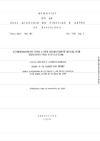Identificador persistente para citar o vincular este elemento:
https://accedacris.ulpgc.es/jspui/handle/10553/1116
| Título: | Considerations over a new recruiment model for exploited fish populations | Autores/as: | Solari, Aldo Pier Bas Peired, Carlos Martín González, Juan Manuel |
Clasificación UNESCO: | 3105 Peces y fauna silvestre 310504 Protección de los peces |
Palabras clave: | Peces Bacalao Mar Báltico Islandia |
Fecha de publicación: | 1999 | Publicación seriada: | Memorias de la Real Academia de Ciencias y Artes de Barcelona | Resumen: | The stock and recruitment (SR) relationships in both Baltic and Icelandic cod are studied. In light of the field data, the relationships are assumed to turn around two orbits of stability or equilibrium states due to the interaction between density-dependent and density-independent compensation and depensation. A general framework is proposed where the SR relationship is considered as as multiple steady-state system which is described as a summation of non-linear- functions allowing for stable, periodic and chaotic dynamics. The SR system is considered as a dynamic continuum, limited by a maximum allowable carrying capacity (Kmax) and a minimum viable population (K0) and may consist of multiple equilibrium states and carrying capacities: stock and recruitment may, persistently, evolve and return between the ceiling and floor of the system allowing for the description of highly complex dynamics. The conceptual advantages of the new framework are discussed. | Descripción: | Memoria leída en la sesión del día 28 de mayo de 1998 | URI: | https://accedacris.ulpgc.es/handle/10553/1116 | ISSN: | 0368-8283 | Fuente: | Memorias de la Real Academia de Ciencias y Artes de Barcelona [ISSN 0368-8283], Tercera época. (960). v. LVIII (5), pp. 157-183 |
| Colección: | Artículos |
Visitas
58
actualizado el 10-ene-2026
Descargas
38
actualizado el 10-ene-2026
Google ScholarTM
Verifica
Comparte
Exporta metadatos
Los elementos en ULPGC accedaCRIS están protegidos por derechos de autor con todos los derechos reservados, a menos que se indique lo contrario.
